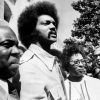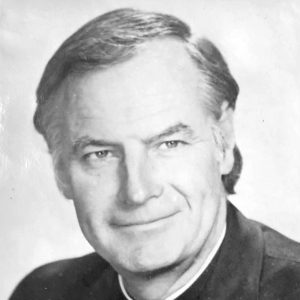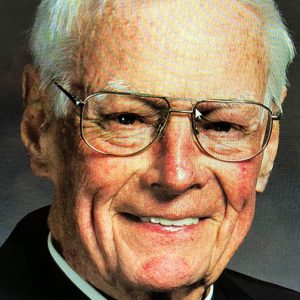calsfoundation@cals.org
John F. O’Donnell (1928–2019)
John O’Donnell, a Roman Catholic priest, served as pastor in various parishes across Arkansas in a career that spanned over sixty years. During that time, he also became known for his work on social justice and civil rights, sometimes being labeled a renegade. Unafraid to speak his mind, he stood up for his beliefs even when it made him unpopular. In a 2015 Arkansas Catholic article, he said, “My viewpoint was that we ought to be at the forefront of peace and racial justice and common sense and respect….We must live and act as we believe. I think the church or the priest should be there promoting justice.”
John F. O’Donnell, the youngest son of Irish immigrants Henry and Bridgett O’Donnell, was born on January 29, 1928, in Philadelphia, Pennsylvania. Athletic, witty, and creative, he played drums in the high school band, was quarterback on the football team, served as a volunteer firefighter, and worked as a cab driver. He loved dancing and music, especially jazz—a love that stayed with him over the years. As an Arkansas priest later in life, he played basketball, tennis, and golf.
While still in high school, he was recruited by the Diocese of Little Rock to serve Arkansas missions, entering St. John’s Seminary in Little Rock (Pulaski County) in 1946, achieving a BA in philosophy, followed by four more years of study in scripture and theology. He was ordained by Bishop Albert L. Fletcher in 1954. His first assignment was as associate pastor of St. John’s Church in Hot Springs (Garland County). He then attended Catholic University in Washington DC for postgraduate studies in English, and he taught English literature for the next five years at Catholic High School for Boys in Little Rock.
From 1960 to 1965, he served as associate pastor at Our Lady of the Holy Souls Church in Little Rock. He became pastor at Holy Cross Church in Crossett (Ashley County) in 1965, and then St. Peter’s in Wynne (Cross County) in 1969. During this time, he was studying psychology during the summers at Arkansas State University in Jonesboro (Craighead County), Memphis State University, and the Gregorian University in Rome. In 1973, he became pastor of St. Joseph’s Church in Pine Bluff (Jefferson County) and was active in many community programs.
O’Donnell was known for being ecumenical, working closely with members of other religions for social justice. He also wrote opinion pieces expressing his concerns about injustice for state and local newspapers such as the Arkansas Democrat-Gazette and the Pine Bluff Commercial. In addition, he participated in protest movements, such as traveling to Selma, Alabama, in 1965 to show his support for civil rights. While at Holy Souls Church in Little Rock, he started the Catholic Interracial Council with two others.
In his clerical duties, he mentored priests and parishioners and oversaw a prison ministry that included prisoners on death row. He was known for being personally involved in his parishioners’ lives and for sermons and speeches that were well thought out, informative, and, most of all, inspiring. A lover of arts, literature, science, and history, O’Donnell infused his talks with references to literature, as well as popular songs and sayings, researching his sources diligently. He was often asked to speak at business and charitable functions and was featured in several newspapers, including the Arkansas Democrat-Gazette, the Arkansas Catholic (previously The Guardian), the Pine Bluff Commercial, and the Times Record of Fort Smith (Sebastian County). He wrote poetry and liked to play pranks on his close friends.
In 1981, he was assigned to the Immaculate Conception Church in North Little Rock (Pulaski County), and in 1990, Pope John Paul II made him a monsignor. However, O’Donnell still insisted that he be called “Father” rather than “Monsignor” by his parishioners.
At the age of seventy-eight, he retired from the parish of Immaculate Conception Church in Fort Smith, moving to St. John’s Manor, a home for retired priests at St. John’s Center, where he filled in celebrating Mass when parish priests were away, serving on various committees, and, while he was able, saying Mass and taking food supplies he had purchased himself to the Abba House.
He died on April 20, 2019, having served sixty-five years as an Arkansas priest. In his homily at O’Donnell’s funeral, Rev. Msgr. Francis Malone recalled asking O’Donnell why he had continued as a priest. O’Donnell replied, “I can’t be anything else….I was not meant to be anything other than a priest.”
For additional information:
“Activist Priest, Once Labeled a ‘Troublemaker.’” Arkansas Catholic, April 26, 2019.
Brandon, Phyllis. “‘Irish Fun’ Name of the Game for Roast, Toast.” Arkansas Democrat-Gazette, March 1, 1992.
Dale, Tina. “Leaving Home Again.” Times Record, June 25, 2006.
“Fr. John F. O’Donnell Named Monsignor.” Arkansas Catholic, March 18. 1990, p. 1.
Hanson, Aprille. “Priest Recalls His Rebellious 1965 Visit to Selma.” Arkansas Catholic, February 7, 2015, p. 3.
Hebda, Dwain. “Msgr. O’Donnell Marks 60-Year Priestly Milestone.” Arkansas Catholic, June 5, 2014.
Hemann, Phyllis. “Parishioners Bid Farewell to Father John.” The Times, July 4, 1996.
Obituary of John Francis O’Donnell. Arkansas Democrat-Gazette, High Profile, April 28, 2019, pp. 1, 9.
Rains, Judy. “John Francis O’Donnell.” Arkansas Democrat-Gazette, February 19, 1989.
Washington, Don. “Priest Nourishes His Soul and Body in Rome.” Pine Bluff Commercial, December 31, 1980.
Mary Ann Stafford
Maumelle, Arkansas



 John F. O'Donnell
John F. O'Donnell  John F. O'Donnell
John F. O'Donnell 



Comments
No comments on this entry yet.